Baby Eczema vs Acne: How to Spot the Difference
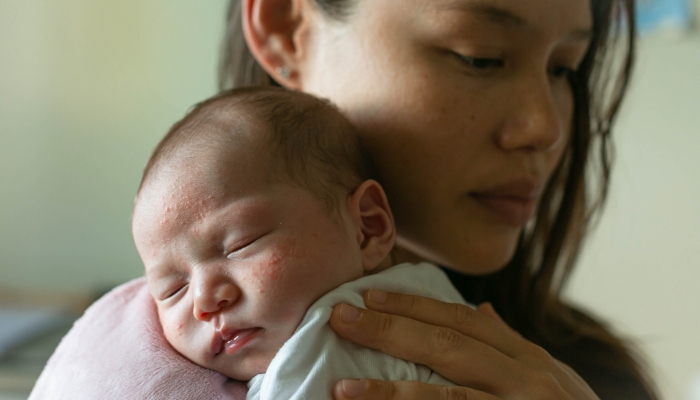
- Baby acne often looks like tiny red or white bumps on the skin.
- Baby eczema often looks like red, dry, scaly skin that is uncomfortable and itchy.
- Baby acne develops in the first couple of weeks after birth.
- Baby eczema develops most often after 6 months of age.
Not every baby has flawless baby-soft skin, and that’s ok. Changes in their skin may be more common than you think. The skin of a newborn is very sensitive and often prone to skin conditions.
Changes in a baby’s skin can range from mild to severe and are sometimes hard to identify. Acne and eczema are two of the more common conditions seen in young children, where you may see redness or bumps on the skin. It’s often hard to tell the difference between the two.
The best way to tell the differences between baby eczema vs acne is to know the characteristics of each.
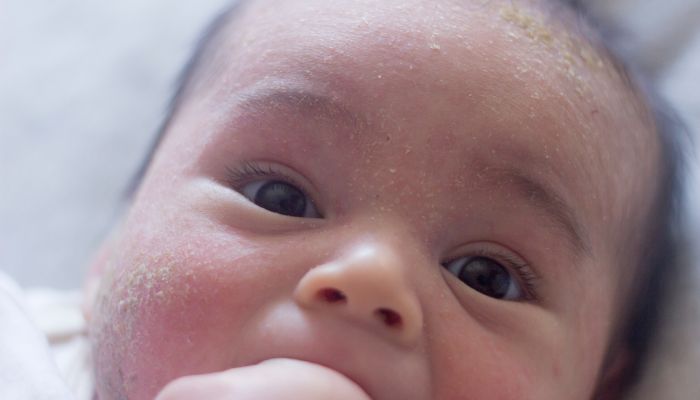
Acne in Babies
Acne is an inflammatory process of the oil glands, hair follicles, and pores in your skin. Acne can happen almost anywhere on your body, but is most common in areas like your face, neck, back, shoulders, and chest.
Baby acne will often present like tiny red or white bumps on the skin of the face.
Acne in babies can be one of two types, either neonatal acne or infantile acne. According to the American Academy of Dermatology, Neonatal acne is seen in about 20% of newborns. Although neonatal acne can be present at any time from birth to 6 weeks of age, it is most often seen at about two weeks old.
When acne develops after 6 weeks of age, we call this infantile acne. The most common age for infantile acne to show up is between 3 and 6 months. Infantile acne is much less common than neonatal acne, affecting only about 2% of kids, but it can possibly persist into teenage or adult acne.
Causes of Baby Acne
The causes of baby acne aren’t completely understood, but we’re thinking it isn’t much different than the causes in other age groups. One of the major factors related to acne is the influence of hormones on the body. For young babies with neonatal acne, the thought is the hormones from the mother are still on the baby’s body and may cause changes to the skin.
There is also a thought that the pores in the baby’s skin aren’t completely developed. The oils on the skin can cause blocked pores, and possible irritants coming into contact with the skin can cause pimples on the skin’s surface.
Will Acne Hurt My Baby?
Neonatal baby acne very often clears up on its own within a couple of weeks or months without the need for medicine or treatment. Neonatal acne does not often scar like we sometimes remember fearing from our own teenage years.
Infantile baby acne is a little bit more concerning. If your child shows signs of acne starting after 6 weeks of age you should have your child seen by a medical provider. The ideal choice would be a board certified dermatologist.
If your baby experiences changes in their skin after 6 weeks that resemble acne, they should be seen by the dermatologist to confirm if what you’re seeing is acne, and determine potential causes.
Infantile acne starting after 6 months of age could be related to an underlying medical condition, or something your baby’s skin is exposed to. Identification of possible causes of infantile baby acne is also important because of the greater risk of scarring when compared to neonatal acne.
How Is Baby Acne Treated?
Thankfully most cases of baby acne will clear up on their own, but there are ways to help get rid of baby acne. Medication is one option to treat baby acne, but it must only be used under the direction of a medical professional. Do not use any over-the-counter treatments without speaking with your child’s doctor.
According to the Mayo Clinic, one of the best ways to support your baby’s skin in clearing up is often related to good skin care.
- Wash your baby’s face with mild soap and warm water.
- When drying your baby’s skin just pat it dry, to avoid rubbing.
- Never scrub any areas with potential skin conditions.
- Don’t use lotions or oils on areas of the skin that might be baby acne.
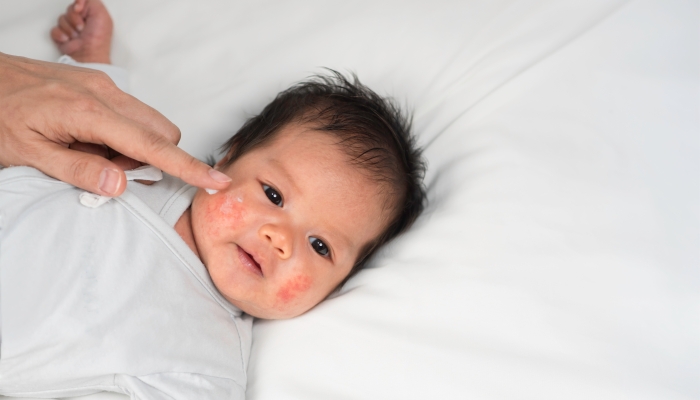
Eczema in Babies
Eczema, also referred to as atopic dermatitis or seborrheic dermatitis, is a skin problem affecting about 10% of kids. Eczema most often starts after about 6 months of age and causes dry, red, itchy skin that for some children can be very uncomfortable. Your baby may scratch their head for a lot of reasons, one of those reasons could be eczema.
For babies, eczema most often shows as a red, dry rash on the scalp and face that includes the cheeks and forehead. As the child gets older you may start to notice eczema showing up in places like elbows and knees.
The symptoms of eczema can include:
- Dry red patches of skin
- Patches of skin that are itchy
- Skin that feels rough
- Skin that looks like scales from dead skin flakes
- Crusty patches that might ooze
What Causes Eczema in Babies?
Our skin serves as a barrier to protect us from the things around us. When someone has eczema, some parts of that protective barrier aren’t working properly. This can make the skin more likely to become dry and irritated.
Eczema isn’t caused by one single thing. Eczema comes from the influence of the environment we are living in, and how that environment affects the cells of our bodies.
There is a genetic aspect to eczema. It is one of those conditions we often see run in a family across generations. It is also known that kids with eczema are more likely to have foodborne allergies and allergic conditions like asthma. Food allergies, however, do not cause eczema.
Unlike other rashes that you may have seen or heard about, eczema is not contagious. There is no risk of getting eczema from another person.
Will Eczema Hurt My Baby?
Eczema itself doesn’t present a true danger to your baby. The dryness or itchy skin can, however, be unpleasant enough to make them irritable or disrupt their sleep.
Although eczema itself is not dangerous, it is important to note that sometimes a patch of eczema can become infected, especially if your child is itchy and scratching or rubbing their skin. If an infection occurs the area may appear honey-colored, or have a yellow crust with oozing from the crusty patches.
Areas of skin that are crusting and oozing should be looked at by a doctor for professional medical advice.
How Is Eczema Treated?
There is no cure for eczema, but there are treatments for managing dry, red, itchy, and irritated skin. Your child’s doctor may choose to prescribe medicated lotions or creams that can help.
Topical steroid medication can be prescribed by your doctor which may help improve the inflammation. This would hopefully improve symptoms like itching and redness. Non-steroid medication can also be prescribed by your doctor to help soothe irritated skin. Whichever your doctor chooses, they need to be used exactly as prescribed.
Since the main problem with eczema is that the skin isn’t holding water as it should, the goal would be to use methods to improve the dryness. This can be done without medication using gentle skin care methods.
- Give your child a bath daily. You don’t need to use soap, but if you do make sure it is gentle, hypo-allergenic soap without a fragrance.
- Pat your baby’s skin dry, and then apply any medicated creams prescribed (always before moisturizer)
- Apply moisturizer immediately after bathing.
- Consider using fragrance-free detergent and fabric softeners to limit potential irritants coming into contact with their skin.
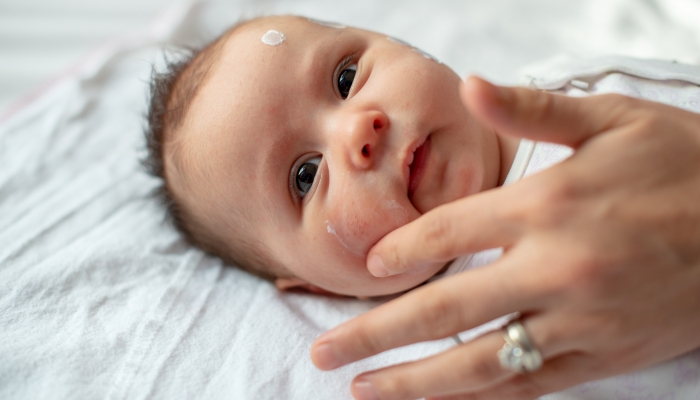
How to Tell if Your Baby Has Acne or Eczema
Based purely on how each looks, baby acne, and eczema can appear pretty similar. They both can cause redness and inflammation to the skin, and they both often occur in common places like the face.
Telling the difference between acne and eczema is more about knowing the characteristics of each like the timing and symptoms.
| Acne | Eczema | |
| Timing | Neonatal Acne – can develop from birth to 6 weeks Infantile Acne – Develops after 6 weeks. | Develops after 6 months of age |
| Location on the body | ||
| Symptoms |
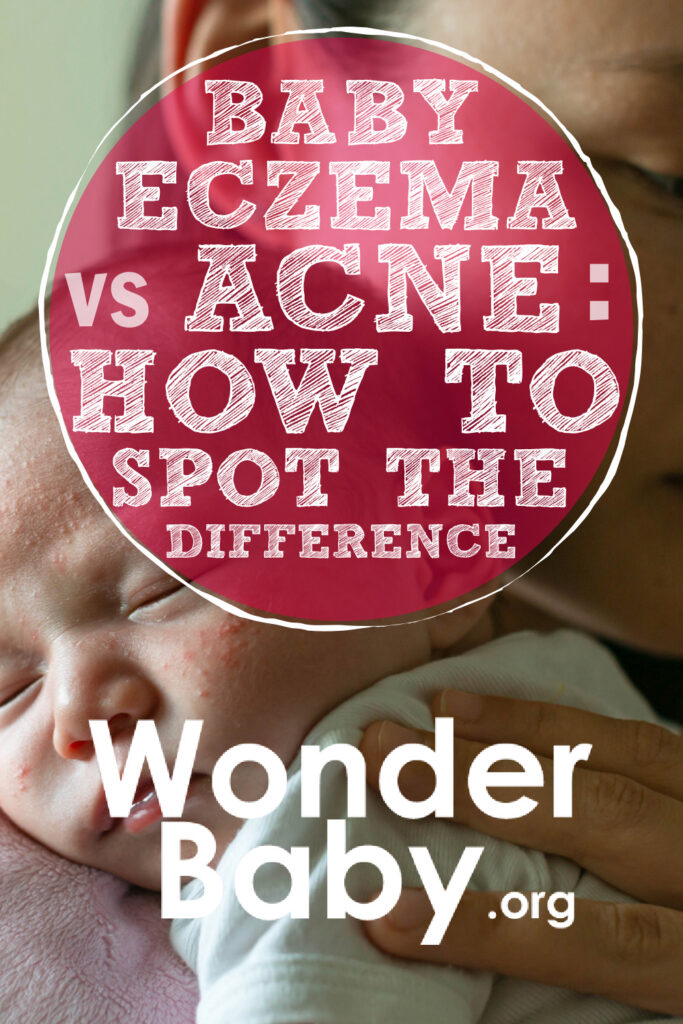
The information WonderBaby provides is not intended to be, and does not constitute, medical or other health advice or diagnosis and should not be used as such. Always consult with a qualified medical professional about your specific circumstances.
Related Posts

Eye Conditions and Syndromes, Visual Impairment
Neuralink Announces Plans to Restore Sight to the Blind with Brain Chip
Elon Musk’s company Neuralink has announced plans to begin human trials of its new “Blindsight” brain chip by the end of 2025.

Health & Nutrition
Can Baby Skin Care Products Expire?
Is that forgotten tube of diaper rash cream still safe to use? Learn more about the expiration dates of popular skin care products for infants.

Health & Nutrition
Boosting Immunity in Kids: 3 Tips for a Healthy Winter
Parents can help boost their kids’ immunity during cold and flu season by maintaining healthy eating, sleeping, and exercising habits in the winter.